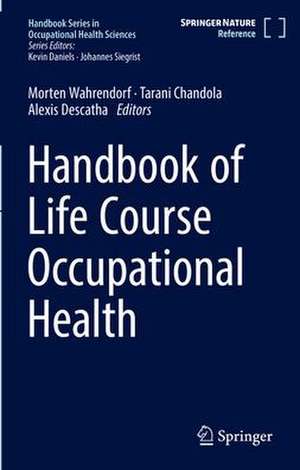Handbook of Life Course Occupational Health: Handbook Series in Occupational Health Sciences
Editat de Morten Wahrendorf, Tarani Chandola, Alexis Descathaen Limba Engleză Hardback – 19 aug 2023
Preț: 2482.55 lei
Preț vechi: 2613.21 lei
-5% Nou
Puncte Express: 3724
Preț estimativ în valută:
475.10€ • 494.18$ • 392.22£
475.10€ • 494.18$ • 392.22£
Carte tipărită la comandă
Livrare economică 10-16 aprilie
Preluare comenzi: 021 569.72.76
Specificații
ISBN-13: 9783031304910
ISBN-10: 3031304918
Pagini: 570
Ilustrații: XXI, 570 p. 66 illus., 51 illus. in color.
Dimensiuni: 155 x 235 mm
Greutate: 1.13 kg
Ediția:1st ed. 2023
Editura: Springer International Publishing
Colecția Springer
Seria Handbook Series in Occupational Health Sciences
Locul publicării:Cham, Switzerland
ISBN-10: 3031304918
Pagini: 570
Ilustrații: XXI, 570 p. 66 illus., 51 illus. in color.
Dimensiuni: 155 x 235 mm
Greutate: 1.13 kg
Ediția:1st ed. 2023
Editura: Springer International Publishing
Colecția Springer
Seria Handbook Series in Occupational Health Sciences
Locul publicării:Cham, Switzerland
Cuprins
Introduction - A Life Course Perspective on Work and Mental Health: The Working Lives of Young Adults - Biomechanical hazards at work and adverse health using Job-Exposure Matrices - Challenges of Large Cohort and Massive Data in Occupational Health - Chemical hazards at work and occupational diseases using Job Exposure Matrices - Gig work and health - Integration of occupational exposure into exposome - Job exposure matrices: Design, validation and limitations - Labour and social policies - Two pathways between occupation and health - Long working hours and health effects - Methods in modeling life course - Pathways to Retirement and Health Effects - Precarious Work and Health - Psychosocial work environment and health: applying Job- exposure matrices - Falling sick while working: an overview of the EU-level policy framework on returning to work following chronic disease(s) - Sequence Analysis and some of its uses to study occupational health - Shift work, night shift and health effects - Transformation of modern work and the rise of employment - Work and non work trajectories - Worksite health-promotion: evidence on effects and challenges - Working careers with common mental disorders - Working careers with physical disability - Adverse Effect of Psychosocial Stressors at Work and Long Working Hours Along the Cardiovascular Continuum - Impact of new technologies on work and employment - Genetics, epigenetics and health at work - Adverse employment histories: concept, measurement and health effects - Occupational trajectories and health inequalities in a global perspective - Conceptual and methodological directions of occupational life course research, included after pandemic changes - Occupational differences in work related mental health: a lifecourse +A2:A31analysis of recent trends in the European context
Notă biografică
Morten Wahrendorf works at the Institute for Medical Sociology of the University Düsseldorf, Germany, where he leads the working group on “Work & Health”. He has previously worked at the International Centre For Life-course Studies in Society and Health (ICLS) at University College London. His main research areas are work stress, health inequalities, life course epidemiology, ageing, and the comparative analyses of longitudinal cohort studies. He leads several projects that investigates both individual and national predictors of working conditions across the life course and their long-term effects on health at older ages. His research expertise spans different disciplines-including public health, epidemiology, statistics and sociology.
Tarani Chandola is a Professor of Medical Sociology. He is the head of the department of Sociology and the director of the Methods Hub in the Faculty of theSocial Sciences at the University of Hong Kong. He joined the University of Hong Kong in August 2021 and was formerly the head of department of Social Statistics at the University of Manchester. His research is primarily on the social determinants of health, focusing on health inequalities and psychosocial factors, social-biological research and the analysis of longitudinal cohort studies.
Alexis Descatha is a Professor in Occupational Health in Paris then in Angers (Western of France), at University of Angers/ Inserm Irster/Ester, and lead the Clinical Toxicological Unit - Poison Control Center, in university hospital of Angers. His research focuses on the epidemiology of work disorders, musculoskeletal and other chronic diseases. He has interest on exposure assessment using a job exposure matrix and on performing systematic reviews. As emergency physician, he also conducts research on emergencies in occupational settings and created the ICOH’s scientific committee on Emergency Preparedness and Response, and involved in ICOH as board member in 2022-24. He is the Editor-in-Chief of Les Archives des Maladies Professionnelles et de l’Environnement. Recently, he was appointed Clinical Professor of Occupational Medicine, Epidemiology and Prevention at Hofstra School of Medicine, USA. In 2021, he received the Légion d’Honneur. To promote transfer research to practitioners in occupational health in a Translational Epidemiology Center on Occupational health, Toxicology, and Preparedness, he is presenting a YouTube channel (with University of Angers support). He is working also in promoting research in occupational health for different national and international agencies.
Textul de pe ultima copertă
Caracteristici
Provides a comprehensive overview of developments in the field of life course occupational health Includes in-depth analysis of links between early life, employment, quality of work and health Focuses on new challenges of a transformed working life and its impact on health



